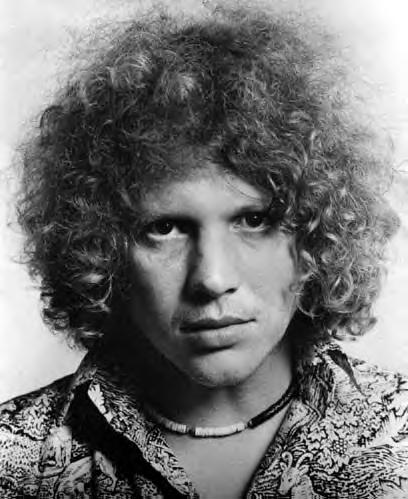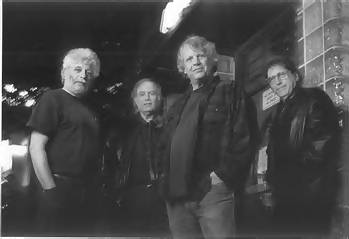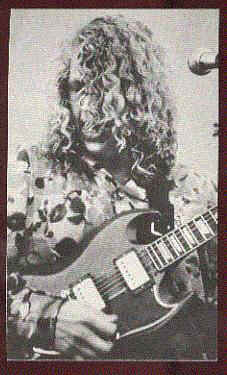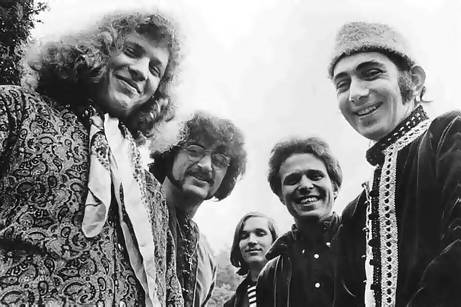EXCLUSIVE
Q&A:
BARRY 'THE FISH' MELTON

Melton, circa 1974.
|
Barry "The Fish" Melton, one of the great
guitarists of the San Francisco psychedelic scene in the '60s, today
practices law as Public Defender of Yolo County, in Northern California. As a co-founder
of Country Joe and the Fish, with Country Joe McDonald, Melton's highly creative, often
dazzling guitar runs (and occasional song) were a large part of the so-called "Band
That Stopped The War." He went on to a long (and still thriving) solo career that
included occasional reunions with McDonald, and the founding of a band of '60s San
Francisco rock veterans, "The Dinosaurs," which included, at various times:
Peter Albin, David Getz, John Cipollina, Greg Elmore, Papa John Creech, Spencer Dryden, Robert Hunter, David
LaFlamme, Jerry Miller, and Merle Saunders. |
The Rip Post caught up with Melton by e-mail, discussing
the state of the criminal justice system, the current reunion of members of the
longest-running line-up of Country Joe and the Fish (of which he is not a part), the old
days, recent music-making, and the current state of political affairs in the United
States. (For more on Barry, please visit http://www.counterculture.net/thefish/ Or enjoy this recent article: http://www.metroactive.com/papers/sonoma/09.29.04/melton-0440.html
)

The Barry Melton Band in 2001.
L to R: Banana, Peter Albin, Barry Melton, Roy Blumenfeld.
|
RIP POST: When I first interviewed you
long ago, you were studying law through a correspondence course, while on the road playing
music. Now you've been a public defender for how many years? How difficult is the work? Do
you find it hard to defend some of the cases, ethically? What kinds of cases do you
typically handle?
MELTON: I've been doing court-appointed indigent criminal defense work
for nearly 22 years, and I've spent the last decade or so working in a public defender's
office. Now that I'm getting a bit long of tooth, I actually serve as the Public Defender
of Yolo County, California, which means I'm the chief administrator of a medium-sized
government law office (thirty-two people, including twenty-two lawyers, four investigators
and support staff). Our work is largely criminal defense, but we are also appointed by the
courts to represent juveniles in delinquency cases, adults and juveniles in dependency
cases, and people the state seeks to deprive of their liberty for mental health reasons,
i.e., people who are alleged by virtue of their mental condition to be unable to care for
themselves or a danger to others. We are also court-appointed counsel of first choice in
certain civil proceedings; for example, we are appointed by the courts to protect the
interests of older people when family members seek to take over management of their
affairs and claim a conservator is necessary to protect their interests.
I very much enjoy my work as a public defender, just as I enjoy my work as a musician. For
me, there are no ethical challenges in the work that I do. In our country, everyone
accused by the government has a constitutional right to competent legal counsel. And in
that context my job is to defend people, not sit in judgment of them.
RIP POST: How did you manage to become a lawyer while out on the road,
playing music? I mean, that really required some discipline. Must have turned a few heads,
I would think?
MELTON: In California, there are three ways to become a lawyer--go to
school, study with a lawyer or study by so-called "distance learning." In my
day, "distance learning" meant correspondence study; however, more recently, the
term has come to be associated with study over the Internet. I truly don't believe that
one method is any harder than the others, as in the end all law students must pass a
three-day examination to be admitted to practice. In music, self-directed study is called
"woodshedding" and studying law is no more or less difficult than that. And
there are well over 100,000 lawyers in California, so whatever it is that it takes to
become a lawyer is well within the reach of most people.
RIP POST: Please tell me, if you can, about some of the more fulfilling
moments in your work. And the least fulfilling. Specific examples welcome.
MELTON: That's really a difficult question for me, as I find my work
generally fulfilling. But the greatest thrill for any criminal defense lawyer is to hear
the foreperson of a jury say, "not guilty," a sound all the more precious in a
difficult case where you never doubted your client's innocence.z
 |
"I have a fondness for ALL of
the incarnations of Country Joe and the Fish, from our humble beginnings as a folk duo all
the way through the relatively sizeable band we appeared with in the movie, More American
Graffiti, and even some of our more interesting one-off configurations." |
RIP POST: You intimately understand how the criminal
justice system can be twisted and unethically manipulated by lawyers and judges. What is
your overall assessment of the state of criminal justice today? Do you feel encouraged, in
the main, or discouraged?
MELTON; As a general rule, I have great faith in the procedural aspects
of the criminal justice system, i.e., the adversary process and the American jury. But
what's rotten is the underlying assumption that severe punishment, without rehabilitative
effort, is an end in itself. In most of the civilized world, antisocial conduct is
something to be treated--not punished. But in our county, we continue to throw away entire
lives for episodes of treatable antisocial conduct. Our Draconian attitude toward
substance abuse is a case in point, as we continue to imprison thousands upon thousands
people for treatable psychosocial problems--despite the fact that research has shown for
years that the overwhelming majority of people with long-term substance abuse problems
have co-occurring mental disorders.
RIP POST: What would you like to see change? For instance, I think DNA
testing should be instantly administered to all incarcerated persons where such evidence
could clear them of a conviction.
MELTON: Certainly DNA evidence has a value, but contrary to popular
belief there are very few cases that can be solved with that kind of evidence. And, in
fact, we should all be somewhat terrified at the implications of over-reliance on the use
of DNA sampling. Right now there's an initiative on the November ballot that seeks to
collect DNA samples from everyone who's arrested for--not convicted of--felony conduct.
It's easy to see how that could progress into government collection of everyone's DNA and
some Brave New World bioengineering. People of my generation, particularly, have learned
that science isn't always wonderful and we need to proceed cautiously lest we destroy
ourselves by our own inventions.
RIP POST: You must often defend people who strain your sympathy. How do
you rationalize this?
MELTON: Quite the contrary, Rip, I rarely defend people who strain my
sympathy and there's nothing to rationalize. I pretty much take people as I find them and
I try not to sit in judgment of anyone--as I said, in my world sitting in judgment is
someone else's job. As long as someone is nice to me, I'm nice to them, and it's rare that
the crime someone is accused of has any bearing on how I relate with them. I've had
wonderful associations with clients on death row, and I've been verbally abused by clients
accused of relatively insignificant misdemeanor conduct.
RIP POST: You ran for judge, correct? Why? Would you do it again?
MELTON: Yes, I ran for judicial office about a dozen years ago. And no, I
wouldn't run for judge again. I've really come to love the work I do, and I simply can't
imagine myself taking on any other role in the legal profession.
RIP POST: When you started out with Country Joe and the The Fish,
certainly you had some notions of the band having social impact, right? Stimulating
thinking, if not "changing the world." I mean, 'Feel Like I'm Fixin'-to-Die Rag'
helped drive LBJ out of office---or at least galvanize those who wanted him out. Which do
you feel has had more impact on society in your life: music or the law?
MELTON: I suspect you're overstating the role of Country Joe and the
Fish, as I doubt we had much of an influence on LBJ's decision to retire. But music was of
a different proportion then, as it was one of the few avenues where young people had a
voice. Things are much different today, particularly with the advent of the Internet.And I
think your question begs a comparison between apples and oranges. As a musician in a rock
band, whatever influence or social impact I may have had is fairly abstract. Perhaps, as
you put it, we helped "galvanize" people. But I think it's more likely that we
provided a focal point or meeting place for people who were already galvanized. On the
other hand, as my county's public defender I have a very tangible, direct and measurable
impact on lives of the people involved in the l0,000 cases per year my office handles.
 |
"We are at an extraordinarily critical
juncture in world history, and the fate of the human race may well hang in the balance on
the outcome. It's time to forget about Vietnam, drop all pretense and idealism, and work
like hell to elect John Kerry." |
RIP POST: Music has become subordinate to your work as
a public defender, for obvious reasons, yet you still make time to play on occasion. How
does it feel, strapping on the guitar after all these years? Do you still write new songs?
Is it easy to shift from one mode to the other?
MELTON: I've got to disagree with the premise of your question, Rip. I
really don't consider my music subordinate to my work as a lawyer, or vice-versa. I play
as many dates per year as most of my musical contemporaries. The only difference is, due
to my job as a public defender my music is far more localized and I've pretty much limited
touring to a few weeks per year. Years ago, when I was handling contractual matters for
Mickey Hart of the Grateful Dead, I laughed when one of Mickey's business managers
observed that I was actually playing far more dates per year than the Grateful Dead.
Admittedly, my dates were (and continue to be) on a far smaller scale. But I continue to
play a lot of music. In fact, I can safely say that over the past several years I've
actually played more dates than my old partner, County Joe--even in this year that he's
started a "new" band with some of our old band members. Check my website -- www.counterculture.net/thefish - I keep a
listing there of many my upcoming dates, as well as a log of dates of done in the past
couple years. And those are only my dates on the website--I sit in with all kinds of
people, all the time. I'm busy, man!
RIP POST: I thought The Dinosaurs was a great idea. Wish you had worked
up more original material with Robert Hunter. Any chance of you guys doing more some time,
now that you're really, really long of tooth?
MELTON: Gee, I didn't read this "long of tooth" question before
I admitted to that infirmity earlier. Hunter's doing great, opening Dead shows, and he
continues to write at a torrid pace. But we live a lot farther away from one another than
we used to, so it's harder to get together. I suppose I'd love to write some more with
Bob, but it's not like I don't have my hands full with all the other stuff I'm doing (and
I'm sure the same is true for Bob). In a perfect world, we'd have lots more time together
gazing at the philosopher's pool!
RIP POST: I've read that your favorite line-up of Country Joe and the
Fish was one of the later incarnations. How do you feel about the earlier version of the
band, from the first three-and-a-half albums (or so), getting back together without you?
You were invited, but declined, correct?
MELTON: I have a fondness for ALL of the incarnations of Country Joe and the Fish,
from our humble beginnings as a folk duo all the way through the relatively sizeable band
we appeared with in the movie, More American Graffiti, and even some of our more
interesting one-off configurations. In fact, I continue to play regularly with Peter
Albin, who was not only the bass player with Big Brother and the Holding Company, but also
toured as part of County Joe and the Fish (along with Dave Getz and Mark Kapner) during
much of 1969. And Peter and I have been working together fairly consistently for over 30
years now! Quite frankly, it seemed fairly strange to me--and rather
"inorganic"--for Joe to reconvene 4/5ths of the band that recorded our first 3
albums (to my memory, Bruce Barthol was not on our 4th album at all). I haven't really
spent a day with any of those guys (much less played with them) in 28 years. I've seen
Bruce from time to time, as I'm a big fan of the San Francisco Mime Troupe, he lives in
Northern California and we went to Jr. High and High School together (in North Hollywood);
but the other guys haven't been in my life at all since before my 30th birthday--and I'm
rapidly approaching double that age (actually, I'm only 57).
No, I was not invited to join the new Country Joe Band. I presume they didn't invite me
because they assumed I would decline--and their assumption is correct if there was an
insistence on a repertoire of mostly old stuff (and I understand from the reviews
I've read they're doing mostly old stuff).* There might well be a place
in this world for a new and revitalized Country Joe and the Fish with a new musical
approach and perhaps even a new lineup, but I couldn't in good conscience lend the Fish
name to a nostalgia act. Having said that, I've managed to get together with Joe and play
music every year or two all through the years; and I'd have no problem playing a gig or
two with him and the other guys in his band maybe once or twice a year. I just don't want
to be the guitar player in a nostalgia band--I find the prospect rather morbid.

Country Joe and the Fish, circa 1968. L to R: Melton, David Cohen, Bruce Barthol,
Country Joe McDonald, Gary "Chicken" Hirsh.
Special thanks to Wildman Dave
Diamond for photos.
|
RIP POST: Your lead guitar playing is
utterly distinctive---with those stinging triplet runs up and down the scale, jarring
sustained notes, runaway frenzied solos. . .Stuff of pure unplanned inspiration. Any
comment on the how and why of this?
MELTON: Oh Rip, you're a fan. I'm not that great a guitar player. But
I've been working at becoming a halfway decent guitar player for a long, long time. I
started at the age of five. So I'll attribute whatever skills I do have to those 50 plus
years of work.
RIP POST: My favorite album of yours is "Barry 'The Fish'
Melton"---the one done in England---and that acoustic album, "We Are Like the
Ocean." Beautiful and memorable tunes abound. Any chance of them coming back into
print?
MELTON: I feel as self-conscious about old record albums as I do about my
guitar playing, but at least there's something I can do to work on my guitar playing and
make it a little bit better each time. There's always a chance of re-releasing those old
albums, and in fact I had a talk with the guy who produced the English album earlier this
month when I was performing in the U.K. But I'm a lot more excited about the re-release of
the Dinosaurs album as a double-album that includes lots of live material and tracks the
band through its various incarnations with Peter Albin, John Cipollina, Papa John Creach,
Spencer Dryden, Bob Hunter, and Merl Saunders. And I'm appearing at a Merl Saunders CD
release party at the Great American Music Hall in San Francisco early next month for a
tribute album for Merl (I sing on one of the tracks), who's not been in the best of health
lately. And finally, we're putting the finishing touches on a DVD that includes not only
great live footage and recordings of what I'm doing today, but also contains a host of
interviews with about a half-million of the musicians I've worked with over the years.
RIP POST: It seems like a joke, something too preposterous to be true,
but the Republicans have succeeded in making Vietnam a central issue of the presidential
campaign. Never mind the extreme things this administration has done to foreign policy,
ally relationships, pollution regulations, constitutional rights, and so on---Vietnam is
what's important! The media play along, as usual. As a former member of "The Band
that Stopped the War," what are your observations and feelings about this sorry,
sorry situation?
MELTON: The answer to this question is so big and complex, you really
don't want me to answer it all. We are at an extraordinarily critical juncture in world
history, and the fate of the human race may well hang in the balance on the outcome. It's
time to forget about Vietnam, drop all pretense and idealism, and work like hell to elect John Kerry.
RIP POST: What's your favorite CJ&Fish album or song(s)?
MELTON: I don't have a favorite album or song. I'll say it again, I'm
somewhat self-conscious about my recorded work. And for the most part, the Country Joe and
the Fish stuff is so old it hardly seems relevant anymore. I listen to my old records
about as often as I look through old photo albums--almost never. And I often cringe when I
listen to the old stuff (the older it is, the more I cringe). So I'm probably the wrong
person to ask about this stuff.
RIP POST: Do you have a favorite memory of how you came to link up with
Joe? And of your time in the band?
MELTON: I assume in the context of your question that when you say,
"the band," you mean Country Joe and the Fish. Which, for me, is an impossible
question to answer because their were at least a dozen different versions of Country Joe
and the Fish over the years, including the original "band" which was a duo. And
Joe and I were still doing gigs as "Country Joe and the Fish" into the
90's--oftentimes as a duo, but also with a host of other people. To many folks, if not
most folks, the version of the band they remember the most is the one that appeared in the
movie Woodstock. And no wonder, the Woodstock album has now sold about 10 times as many
copies as all of the Country Joe and the Fish albums put together and I feel quite
confident in saying that the movie has probably been seen by hundreds of millions of
people on our planet.** Which, in essence, reduces my 30 seconds of fame to an image of a
long-haired guy in a floral shirt holding what appears to be a joint up to a camera lens.
But for me, the version of County Joe and the Fish I remember best and the gig which
brings on the greatest wave of nostalgia, is our first gig as an "electric"
band. We played at the Life Sciences Building on the UC Berkeley campus with Alan Ginsburg
and the Fugs. It was a riotous and memorable evening--Steve Weber of the Fugs took a
head-first dive off a 15-foot lectern and seemed totally impervious to injury. Ed Saunders
and Tuli Kupferberg were in their prime, and Alan had just returned from India with a
harmonium and a repertoire of mantras. It was the first time I appeared in public playing
an electric guitar, and we had Richard Saunders on bass (who has since gone on to become
one of the Bay Area's most distinguished Klezmer musicians). It was a marvelous time.
RIP POST: And yes, the inevitable question: Any
chance you will ever join the band again, even for a gig or two?
MELTON: If you're talking about the "new" Country Joe Band, I
think I answered that question. If you're talking about yet another version of Country Joe
and the Fish, who can say?
*The new Country Joe Band is
indeed reviving the brilliant
early repertoire of the band, but also performs a new song by Bruce Barthol,
"Cakewalk to Baghdad," new instrumentals by keyboardist/guitarist David Cohen,
and a good amount of later solo material by Country Joe McDonald, including the lovely new
anthem, "Summer of Love." An album of new material is reportedly in the works.
**This later version of the group released one very pleasant album which went all but
unnoticed in 1970, "CJ Fish."
Drop Barry a line at. . .
Barry Melton a/k/a Barry "The Fish" Melton
PO Box 72505
Davis CA 95617
BACK TO
PAGE ONE |
![]() Q&A
Q&A